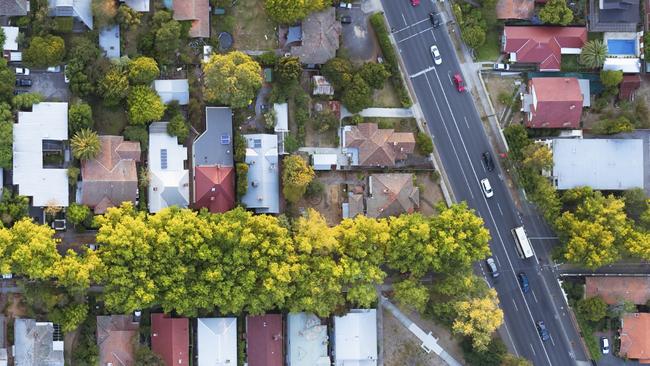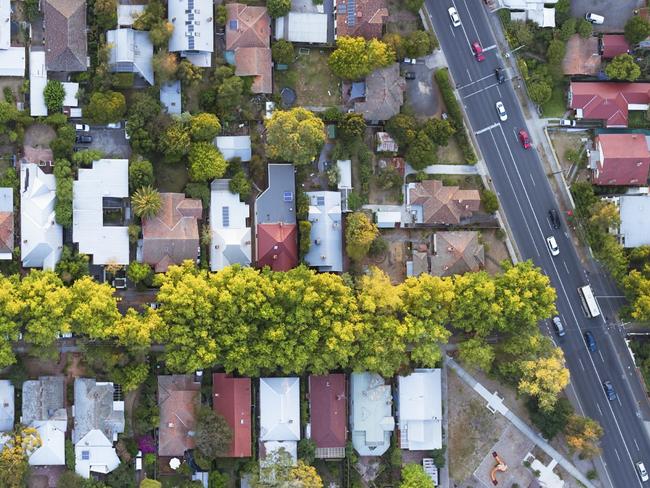Not-so-super home deposit scheme will leave average Aussie just $2500 better off
A SUPER fund manager has crunched the numbers and reckons the vaunted first home buyer saver account is a lot of investment for not much return.

A SCHEME to help first home buyers save for a deposit received much fanfare when announced in the Budget on Tuesday.
The scheme allows people to put away up to $15,000 a year into their superannuation pre-tax if they are saving for a deposit. You can only do it for two years so the maximum you can save is $30,000.
Treasurer Scott Morrison promised it would “boost savings by up to 30 per cent.”
But Superfund Partners director Mark Beveridge has crunched the numbers to find out if it will actually help first home buyers that much.
He says the average person would only save about $2500 extra a year.
Mr Beveridge says that even if you are in a couple and save the maximum amount over two years, the total benefit is still less than $10,000.
“As a financial planner, you want to get all the benefits you can, but is it going to make a huge difference? It’s not an earth-shattering free kick for young savers,” he told news.com.au.
“I think the effect will be minimal, a small effect at the margins, a few crumbs.”

THE AVERAGE AUSSIE — HERE COMES THE MATHS
So here’s how it works.
Meet Mark’s fictional case study, Julia. She earns the average wage of $79,721 per annum.
From July 1, 2017, under the First Home Super Saver Scheme, she will be able to make voluntary contributions of up to an $15,000 in 2017-18, and $30,000 in total into her superannuation to buy a first home.
Her $15,000 gets taxed at 15 per cent on the way into superannuation, leaving Julia with $12,750 in her First Home Super Saver Scheme account.
The Australian Taxation Office will set the rate of growth that is allowed to apply. Even if Julia’s superannuation fund return was 10 per cent, the “deemed” rate of growth on the First Home Super Saver Scheme part of the account will only be 4.78 per cent per annum.
Now, Julia wants to withdraw the money on July 1, 2018 (the earliest date). There is a tax on the entire withdrawal which will be at her marginal tax rate, less a 30 per cent rebate. If Julia starts with the $12,750 net contribution, plus the deemed earnings of $609.45 (assuming the $15,000 went in on day one — which it won’t), the gross amount withdrawn would be $13,359.45.
This will be added to her taxable income for that year and taxed at her marginal tax rate.
Suppose Julia received a standard two per cent payrise in line and her salary goes up to $81,315. Income up to $87,000 is taxed at 32.5 per cent, plus the two per cent Medicare levy, while income over $87,000 will be taxed at 37 per cent, plus the two per cent Medicare levy.
Julia’s tax will therefore be $1961 on the part of the superannuation withdrawal that took her up to $87,000 and $2993 on the part that was above the $87,000 threshold, making her total tax $4954.
However, Julia will receive the 30 per cent tax rebate on her withdrawal of $13,359.45 — $4007.83 — to offset some of this.
So Julia ends up only paying a net tax of $946.17. Deduct that net tax off her withdrawal of $13,359.45 and we get back to a net of $12,413.28 available for putting towards her first home.

How does this compare to her options before Budget night?
Using the same set of assumptions, with Julia’s marginal tax rate of 34.5 per cent including the Medicare levy, her $15,000 after normal tax would have been reduced to $9825. Assume Julia has made 2.5 per cent interest on that, or a net of $160 after her 34.5 per cent marginal tax rate, and we have $9985 as a comparison amount.
Julia ends up $2428 better off following the Budget’s new scheme — $12,413 compared to $9985.
She can do this for up to two years. If she has a partner who has also never owned a home, they can do this as well. But even at maximum savings over two years for a couple, the total benefit is still less than $10,000.
‘A FEELING OF GENIUS’
It doesn’t appear the move will actually do much to improve housing affordability after all — especially if house prices increase in line with the small growth in first home buyers’ savings.
“It will only take you 200 yrs to save for a house deposit instead of 240 yrs,” tweeted advertising expert Dee Madigan, who has worked on election campaigns for the Labor Party.
“It’s very different to what a lot of young people hoped for in terms of being able to dip into super,” says Mr Beveridge. “But if they did allow access to super, it would simply push house prices up. The money would go straight to the vendors.”
The Government had to move away from that idea after widespread criticism that it would simply fuel the demand for housing and perpetuate the problem.
Instead, they appear to have brought in a scheme that will do little to help anyone — although it sounds good on paper.
“You can imagine the feeling of masterstroke genius that must have gone through the mind of the person who dreamt up the scheme,” says Mr Beveridge.
“In my opinion, the First Home Super Saver Scheme is unlikely to add too much fuel to the housing market or boost Liberal Party stocks with the ‘smashed avocado’ voters. It will frustrate other superannuation funds though.
“You can bet software architects at superannuation funds are spitting chips right now about the new coding they are going to have to write to accommodate this new type of contribution.”
The scheme looks set to be as ineffectual as Labor Party’s First Home Saver Account. Buyers will just have to wait and see if it does them any favours.



